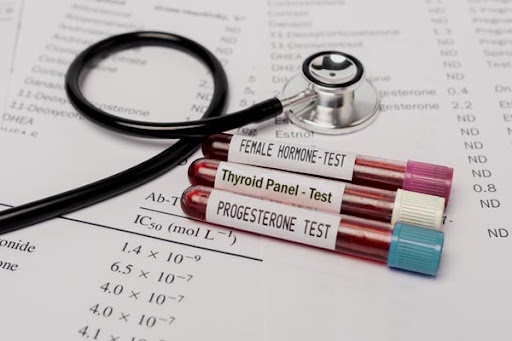Menopause Blood Test: A Comprehensive Guide to Understanding Your Hormonal Health

Menopause Blood Tests: Essential for Understanding Your Hormonal Health
Menopause is a natural stage in every woman's life, but its symptoms—such as hot flashes, mood swings, and sleep disturbances—can be challenging. One of the most effective ways to understand these changes and manage your health is through a menopause blood test. Regular testing can help monitor your hormone levels, guide treatment decisions, and give you peace of mind as you navigate this important life transition.
What Is a Menopause Blood Test?
A menopause blood test measures the levels of key hormones that regulate the menstrual cycle and overall reproductive health. These hormones, including estrogen, progesterone, and follicle-stimulating hormone (FSH), fluctuate during menopause, leading to various symptoms. A blood test helps identify the stage of menopause you’re in and provides insights into your hormonal health.
Types of Menopause Blood Tests
There are several types of menopause blood tests available, depending on the symptoms and concerns you may have. Here are some common tests:
- - FSH Test: Measures the level of follicle-stimulating hormone, which rises as menopause approaches.
- - Estrogen Test: Assesses estrogen levels, which typically drop significantly during menopause.
- Progesterone Test: Evaluates progesterone levels, which decline during perimenopause and menopause.
- - Comprehensive Hormonal Panel: A broader test that measures multiple hormones to provide a comprehensive view of your hormonal health.
Why Do You Need a Menopause Blood Test?
Menopause blood tests are important for several reasons:
- - Diagnosing Menopause: Confirm if you're in perimenopause, menopause, or postmenopause, and understand what that means for your health.
- - Managing Symptoms: Hormonal changes during menopause can cause symptoms like hot flashes, mood swings, and sleep issues. A blood test can help pinpoint which hormones are out of balance.
- - Monitoring Treatments: If you’re undergoing hormone replacement therapy (HRT) or other treatments, blood tests help monitor their effectiveness and guide any adjustments.
- - Preventing Long-Term Health Risks: Early detection of hormonal changes can help prevent conditions like osteoporosis and heart disease, which are more common after menopause.
What to Expect During a Menopause Blood Test
The process of getting a menopause blood test is straightforward and typically involves the following steps:
- - Consultation: Your healthcare provider will ask about your symptoms and medical history to determine which tests are appropriate for you.
- - Blood Sample Collection: A small blood sample is drawn from a vein in your arm. This procedure is quick and causes minimal discomfort.
- - Laboratory Analysis: The blood sample is sent to a laboratory for analysis to measure your hormone levels.
- - Results and Follow-Up: Results are typically available within a few days. Your healthcare provider will review your results with you and suggest next steps, which may include lifestyle changes or hormone therapy.
Interpreting Your Menopause Blood Test Results
Your menopause blood test results will give you valuable information about your hormonal health:
- - FSH Levels: Elevated FSH levels generally indicate perimenopause or menopause, as ovarian function declines.
- - Estrogen Levels: Low estrogen levels can cause classic menopause symptoms like hot flashes, mood changes, and vaginal dryness.
- - Progesterone Levels: Decreased progesterone is common during perimenopause and menopause and can contribute to irregular periods and hormonal imbalances.
- - Comprehensive Panel: A full hormonal panel helps provide a clearer picture of your hormonal health, guiding more personalized treatment options.
Who Should Get a Menopause Blood Test?
You may want to consider a menopause blood test if you're experiencing any of the following symptoms:
- - Irregular Periods: Changes in your menstrual cycle can signal the onset of perimenopause or menopause.
- - Hot Flashes: Sudden feelings of heat, often accompanied by sweating.
- - Mood Swings: Increased irritability, anxiety, or depression.
- - Sleep Disturbances: Trouble falling or staying asleep, or waking up frequently during the night.
- - Vaginal Dryness: Decreased lubrication and discomfort during intercourse.
- - Fatigue: Persistent tiredness or lack of energy.
- - Family History: A family history of menopause-related health issues may increase your risk.
Why Choose Compare Health for Your Menopause Blood Test?
At Compare Health , we make it easy for you to take charge of your hormonal health with our convenient and reliable menopause blood tests. Here’s why you should choose us:
- - Convenient Testing Options: Whether you prefer an at-home test or an in-clinic appointment, we offer a range of flexible testing options to fit your needs.
- - Trusted Providers: We partner with experienced healthcare providers and laboratories to ensure you receive accurate, reliable results.
- - Expert Guidance: Our healthcare team is here to help you interpret your results and guide you through the next steps, whether that involves lifestyle changes, hormone replacement therapy, or other treatments.
- - Quick, Secure Results: Receive your test results quickly, so you can take informed action to manage your menopause symptoms and overall health.
Book Your Menopause Blood Test Today
Don’t wait to understand and manage your hormonal health. If you’re experiencing symptoms of menopause or want to get ahead of potential health concerns, booking a menopause blood test is a crucial first step.
Book your menopause blood test with [Your Healthcare Provider Name] today and take control of your health. Our trusted providers are ready to help you understand your hormone levels and provide personalized recommendations.
By taking this important step, you can confidently manage your menopause symptoms and improve your quality of life as you transition into this new phase of life.

Name of test: AMH (Anti-Mulerian Hormone) Test
What does it test for: Anti-mullerian hormone (AMH)
Description: The AMH blood test will indicate if your levels are normal for your age and is useful if considering fertility treatment such as egg freezing or IVF.
Price breakdown: Test cost: £45 | Clinic fee: N/A | Postage: Included | GP Appointment: N/A


Exclusive: To get £5 off your order and get your test for £50 you must use discount code HT24.

Name of test: Female Hormones (Menopause) Home Test Kit
CHT remarks: "A test that check female sex hormones and assess menopausal "
Discounts available for subscriptions


Name of test: Menopause Blood Test
What does it test for: Thyroid | Hormones
Description: This Menopause blood test is ideal for anybody experiencing symptoms of menopause including hot flushes, night sweats, memory loss, mood swings and erratic menstrual periods.
Price breakdown: Test cost: £79 | Clinic fee: N/A | Postage: Included | GP Appointment: £45 (optional add-on)

Name of test: Menopause Health Blood Test
What does it test for: Alkaline Phosphatase (ALP) | Corrected Calcium | Follicle Stimulating Hormone (FSH) | Free Androgen Index | Testosterone (Total) | HbA1c | HDL (high-density lipoprotein) | HDL Ratio | | Liver | Luteinising Hormone (LH) | Magnesium (serum) | Oestradiol (Oestrogen) | Progesterone | Prolactin | Sex Hormone-Binding Globulin | Total Cholesterol | | Vitamin D (25 OH)
Description: Our menopause test kit is a good health check-up if you have reached menopause or are post-menopause.
Price breakdown: Test cost: £119 | Clinic fee: N/A | Postage: £2.95 | GP Appointment: N/A



















